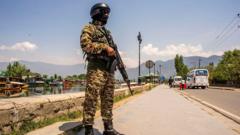Pakistan's information minister, Attaullah Tarar, reported that the nation possesses "credible intelligence" indicating India’s intention to conduct a military strike within the next 24 to 36 hours. This statement follows a particularly violent attack in Indian-administered Kashmir that resulted in the deaths of 26 tourists, for which India has blamed Pakistani militants. Islamabad, however, has firmly rejected these accusations.
Tarar emphasized that India appears to be utilizing the recent attack as a "false pretext" to justify a military response, cautioning that any such actions would be met with a "strong and decisive" reaction from Pakistan. The Indian government has not yet publicly responded to these serious allegations.
The deadly assault occurred near Pahalgam, marking one of the most tragic civilian attacks in Kashmir in two decades. Both nations stake claims to the region, having engaged in two wars over it since the partition in 1947. In recent days, exchanges of gunfire have been reported across the Line of Control, indicative of heightened military readiness on both sides.
In the wake of the attack, Indian authorities have intensified their security operations, detaining over 1,500 individuals in connection with the ongoing investigation. It has been reported that several residential structures tied to alleged militants have been demolished, further raising tensions in the region.
While the identity of the attackers remains uncertain, Indian police have identified three of the four suspects, claiming two are Pakistani nationals and one a local from Kashmir. The complexities of the violence are compounded by the admission from a lesser-known group, the Resistance Front, which initially claimed responsibility for the shooting but later denied any involvement. This front is believed to have ties to Lashkar-e-Taiba, a militant organization based in Pakistan.
The attack has provoked a strong backlash throughout India, with Prime Minister Narendra Modi vowing to pursue the attackers "to the ends of the earth," vowing severe repercussions for those responsible for orchestrating the tragedy. As the situation evolves, observers remain concerned about the potential for escalation between these two nuclear-armed neighbors.
Tarar emphasized that India appears to be utilizing the recent attack as a "false pretext" to justify a military response, cautioning that any such actions would be met with a "strong and decisive" reaction from Pakistan. The Indian government has not yet publicly responded to these serious allegations.
The deadly assault occurred near Pahalgam, marking one of the most tragic civilian attacks in Kashmir in two decades. Both nations stake claims to the region, having engaged in two wars over it since the partition in 1947. In recent days, exchanges of gunfire have been reported across the Line of Control, indicative of heightened military readiness on both sides.
In the wake of the attack, Indian authorities have intensified their security operations, detaining over 1,500 individuals in connection with the ongoing investigation. It has been reported that several residential structures tied to alleged militants have been demolished, further raising tensions in the region.
While the identity of the attackers remains uncertain, Indian police have identified three of the four suspects, claiming two are Pakistani nationals and one a local from Kashmir. The complexities of the violence are compounded by the admission from a lesser-known group, the Resistance Front, which initially claimed responsibility for the shooting but later denied any involvement. This front is believed to have ties to Lashkar-e-Taiba, a militant organization based in Pakistan.
The attack has provoked a strong backlash throughout India, with Prime Minister Narendra Modi vowing to pursue the attackers "to the ends of the earth," vowing severe repercussions for those responsible for orchestrating the tragedy. As the situation evolves, observers remain concerned about the potential for escalation between these two nuclear-armed neighbors.


















